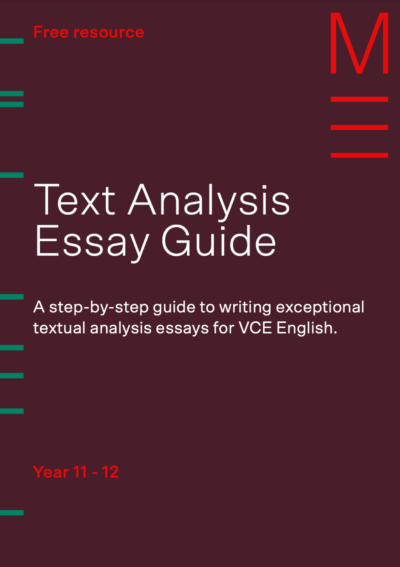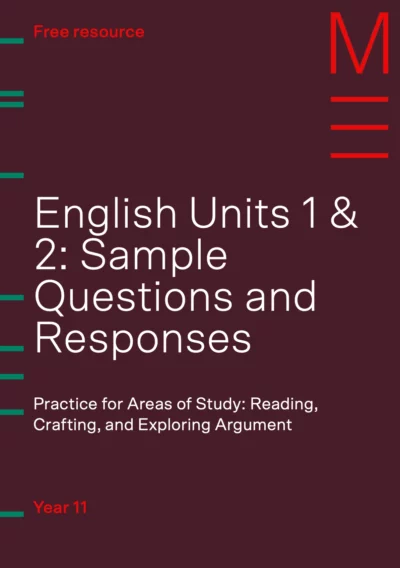Welcome to Matrix Education
To ensure we are showing you the most relevant content, please select your location below.
Select a year to see courses
Learn online or on-campus during the term or school holidays
Learn online or on-campus during the term or school holidays
Learn online or on-campus during the term or school holidays
Learn online or on-campus during the term or school holidays
Learn online or on-campus during the term or school holidays
Learn online or on-campus during the term or school holidays
Learn online or on-campus during the term or school holidays
Learn online or on-campus during the term or school holidays
Learn online or on-campus during the term or school holidays
Learn online or on-campus during the term or school holidays
Select a year to see available courses
Science guides to help you get ahead
Science guides to help you get ahead
Start Year 11 strong with this simple guide to VCE English Units 1 & 2—learn the essentials and boost your skills.

Join 75,893 students who already have a head start.
"*" indicates required fields
Related courses

Join 8000+ students each term who already have a head start on their school academic journey.
VCE English Units 1 and 2 are your foundation for success in Year 12. While these Year 11 units aren’t externally assessed, they’re still important. Why? Because they help you build the writing skills you’ll need for Units 3 and 4, which determines your final VCE English score.
This is Part 1 of our guide to mastering VCE English Units 1 & 2. In this article, we’ll focus on Unit 1, breaking down key skills and what you should focus on this year.
Table of contents:
To learn about Unit 2, read Part 2 of the guide here.
The Year 11 English course is split into two units—each with two Areas of Study. Here’s how it breaks down:
| Unit | Area of Study | Title | Overview |
| 1 | 1 | Reading and Exploring Texts | Close study of one set text (chosen by schools) with a focus on forming and articulating personal connections and interpretations. |
| 1 | 2 | Crafting Texts | Creative writing for imaginative, persuasive and informative purposes, influenced by the careful study of three or more ‘mentor texts’ (chosen by schools). |
| 2 | 1 | Reading and Exploring Texts | Developing and deepening the inferential reading skills from Unit 1, focusing on one set text (chosen by schools) of a different type from that studied in Unit 1. |
| 2 | 2 | Exploring Argument | Studying persuasive writing and presenting skills, and delivering an ‘oral point of view presentation’ on a contemporary topic of local or national importance. |
So, what exactly are you expected to do in each part of Year 11 English? Below, we’ve outlined the essential skills for each Area of Study and how to apply them.
A step-by-step guide to writing exceptional textual analysis essays for VCE English. Fill out your details below to get this resource emailed to you. "*" indicates required fields
FREE VCE Text Analysis Essay Guide

FREE VCE Text Analysis Essay Guide
This part of VCE English is all about reading texts deeply and finding the meaning beyond the surface. You’ll learn to spot how authors create meaning and how to explain those choices in your own writing and discussions. Here are the key skills you will need and what you can do to build them!
Key skill #1: Develop strategies for inferential reading and viewing
When you’re reading your English texts, go in like an investigator:
Keep a checklist while reading. What’s the text type? Who’s telling the story? What techniques jump out?
Key skill #2: Explore ideas, characters, plot, and techniques
Authors make choices on purpose. Your job is to figure out why.
Try this: For every paragraph or chapter, write one sentence explaining what the author wants you to notice or feel.
Key skill #3: Engage productively in discussions
The keyword here is “productively”. Your group discussions need to build new ideas.
Key skill #4: Develop, share and clarify ideas in class
Don’t wait until you’re 100% sure; just have a go. Set a goal to contribute at least once per lesson. Challenge yourself to ask one genuine question! It will help boost your confidence and understanding.
Key skill #5: Plan and write personal and analytical responses using metalanguage
“Metalanguage” means the “technical terms used to discuss language itself”.
Key skill #6: Support your ideas using textual evidence
By now, you’ve probably been told countless times to include examples in your essays. In Year 11, this becomes non-negotiable. You must support every point you make with evidence from the text.
Key skill #7: Review and edit writing
Writing well means rewriting. The first draft is never the final product.
After every piece of writing, reflect on one thing you did well and one thing you’ll improve next time.
Key skill #8: Use correct syntax, punctuation and spelling
What makes an essay good is the fact that it is easy to follow and free from errors.
Now that you’ve learned how to read and analyse texts, it’s time to start writing your own! In the next Area of Unit 1, you’ll focus on crafting texts, where you’ll use language in creative ways to share your ideas and show your writing style.
VCE writing strategies with expert teachers
Learn from expert VCE teachers and resources. 84% of Matrix students score a 90+ ATAR. Book your free trial.
This part of Year 11 is your chance to get creative. You’ll be writing stories, speeches, and personal reflections. The goal is to make purposeful and engaging choices in language, structure and style. Here’s how to sharpen your writing skills and make your work stand out.
Key skill #1: Use structure, language and vocabulary creatively
Don’t play it safe by sticking to the obvious ways to structure and express your ideas. Experiment and get creative!
Ask yourself: “Have I said this in a way that’s new and original?”
Key skill #2: Write with purpose, audience and context in mind
Before you start writing, decide who you are writing for and what you want them to do, think or feel after reading your work.
Ask someone to read over your draft. If your reader can’t tell why you wrote the piece or who it’s meant for, go back and clarify your message.
Key skill #3: Plan and structure your writing
A good piece of writing is always planned. Organise your ideas and choose a structure that fits the task. For example:
Key skill #4: Create, discuss and explore your ideas
Sure, you need a great idea, but that’s not all. What really matters is how you develop it by adding depth or twists and turns.
Once you’ve got your main idea, ask: “What happens if I take this further?” Don’t settle for your first thought; build on it.
Markers want to see that you can develop your idea and play around with it.
Key skill #5: Choose the appropriate voice
Think carefully about how you “speak” to your reader. Should your tone be serious, playful, emotional?
Choose a voice and style that suits your purpose, and make sure you can keep it consistent throughout your piece. Before you start, decide:
Each choice creates a different effect, so think about what will work best for your audience and message. Then, stick with it!
Key skill #6: Experiment with vocabulary
Avoid clichés and vague language. Instead, use specific, surprising words that bring your ideas to life.
For example, instead of writing “she was really sad,” you can write something like “grief sank into her bones.” Keep a list of phrases that catch your attention in other people’s writing that you can draw inspiration from.
Key skill #7: Plan, create, draft, and refine your writing
Think of creative writing as the result of a process. You should be shaping and reshaping it until your message is clear and engaging.
After your first draft, take a break. Then come back with fresh eyes or ask someone else what they think of it. Make changes based on what’s working and what isn’t.
Key skill #8: Learn from other writers
Reading great writing helps you write better. Notice how authors use structure, imagery, and voice. Ask yourself: How did they get that emotion out of me? Can I try something similar in my own work?
Key skill #9: Reflect on your own writing choices
When you’re using certain imagery or metaphors, make sure you know why you’re using them. Be prepared to explain your choices in your work.
For each technique you identify, consider how it affects your reader and how the impact of the text would be changed if that technique had not been used.
Key skill #10: Use standard and non-standard conventions
It’s important to use Standard Australian English correctly (spelling, punctuation and grammar) in most of your writing.
But, sometimes breaking the rules (on purpose!) can make your writing more powerful. This is called using non-standard conventions.
Know the rules first, then decide when it’s effective to bend them. For example, dropping punctuation might suit a poetic style, but not a formal piece.
Download our free sample questions and solutions for VCE English Units 1 and 2 and get confident with your assessments!
Get sample questions and answers for Units 1 & 2: Reading Texts, Crafting Texts, and Exploring Argument. Fill out your details below to get this resource emailed to you. "*" indicates required fields
Ace every Area of Study in VCE English

Ace every Area of Study in VCE English
Written by Matrix Education
Matrix is Sydney's No.1 High School Tuition provider. Come read our blog regularly for study hacks, subject breakdowns, and all the other academic insights you need.© Matrix Education and www.matrix.edu.au, 2025. Unauthorised use and/or duplication of this material without express and written permission from this site’s author and/or owner is strictly prohibited. Excerpts and links may be used, provided that full and clear credit is given to Matrix Education and www.matrix.edu.au with appropriate and specific direction to the original content.